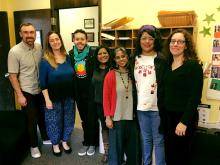Submitted by Suzanne St Peter
on
When it comes to the relationship between the US and Mexico, these days it’s common to hear about walls more than bridges, fraught politics more than fierce friendships. In a small way, one CHID program hopes to change that. The study abroad program “LGBTQ Communities, Public Health, and Migration in Mexico” explores questions that put US and Mexico relations within a broader framework of borders, opportunity, safety, and dignity. Focusing on the voices and stories of the LGBTQ communities, the program seeks to understand issues of identity, gender, and sexuality from a Mexican perspective. We share stories about ourselves and our own identities, and think deeply about what it means to hold another’s vulnerability with care and conviction. And—in the process of going abroad, learning, conversing, and returning home—we also forge meaningful relationships across various sites of difference.
To deepen these relationships, we recently brought two Mexican activists to Seattle, Jessica Duran Franco and Francisco Tenorio Hernandez. Our guests met with the new group of UW students who will participate in the program this coming Summer and rekindled friendships with students they met last year. Jessica and Francisco shared their work on LGBTQ issues in Mexico City in numerous venues across Seattle: here at UW with small groups of students, staff and faculty; at the national 2017 Movimiento Estudiantil Chicano de Aztlán (MEChA) conference at Seattle Central College; and at events around town sponsored by Entre Hermanos, a local nonprofit that serves Seattle’s Latino LGBTQ community.
As a result of the learning community that was formed by this program, Summer 2016 student participants were inspired to create a resource for other students looking at LGBTQ-focused study abroad opportunities. The Queer Study Abroad Resource (“The Q-SAR”) is a post-trip reflection project that addresses difficult questions about study abroad, identity, privilege, and solidarity with grace and humility. This resource includes perspectives from students who identify as LGBTQ as well as allies. Here are some insights that students have shared:
“What is it like being a queer person studying abroad? What are the Western connotations of ‘queer’ and how might this term mean different things abroad?”
“As always, the word ‘queer’ is incredibly complex. Though I was familiar with the English-speaking world ‘reclaiming’ the word from its slur origins, it was really interesting to learn about the Western associations Mexican students and educators made with the word, so much so that an alternative (‘cueer’) has been suggested instead. Rethinking all my associations coming from academic queer theory was fascinating and made it easier for me to relate to the Mexican LGBTQ community members we met… I began to understand why people (particularly those from the global south) might find queer ideas to be inaccessible… I feel like I have a better understanding of LGBTQ struggles from a more globalized perspective as a result of this trip, and for that reason I appreciated this opportunity to travel as a queer person in a new and unfamiliar country.” – Queer, Trans, Mixed Race Person.
“Why should LGBQ and Trans allies participate in a Queer-focused study abroad program?”
“When I was looking through this program, I wasn’t sure if I really wanted to do it. I told myself, “This isn’t my place to take.” I knew that my knowledge of the LGBTQ community was lacking and I didn’t want that to show. I didn’t want to come off as that one straight person who’s sticking their head in where they don’t belong. Then I realized, if I continue with that mentality, I’ll be confined to a single perspective. Going on this study abroad, I was able to ask questions without judgement. Change begins with awareness.” – First Generation College Student, Latina, Migrant Student.
You can explore more student developed questions and answers in the Q-SAR here: https://issuu.com/mexicocitylgbtqstudyabroad/docs/mexicocityqueerstudyabroadresource
While the CHID “LGBTQ Communities, Public Health, and Migration in Mexico” program is but a small offering, our connections, insights and friendships across borders and categories of difference have proven quite large. No walls for us please; only fierce love and solidarity.
By Sasha Duttchoudhury and Anu Taranath
